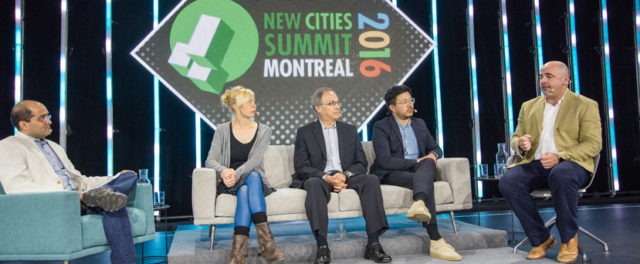
People Powered Cities
September 6, 2016 — Blog
This post is part of our Age of Urban Tech discussion series, following the fifth edition of the New Cities Summit in Montréal in June 2016.
How will people and technology collide to open up new pathways for energy creation and management at the city scale?People Powered Cities set its sights on how the relationship between citizens and their energy supply may change in the 21st century city. Luise Neumann-Cosel held the matter to be fundamentally a question of citizens’ mentality towards energy production in their communities and their sense of shared responsibility. Her company, BürgerEnergie Berlin, is a citizens’ cooperative that seeks to bring ownership of Berlin’s vital electricity grid back to citizens, and is one among hundreds of citizens’ cooperatives in Germany. More than half of the renewable energy fed into the German power grid is produced by citizens and is publicly owned.
Fostering a sense of ownership among city dwellers ties directly into DongPing Wong’s belief that we must change “the psychology of how we deal with the environment.” For Wong, groundup projects that generate avenues for grassroots activism are desirable. Even creating pockets of energy generation within a city, such as the use of turbines in New York’s East River area, still encourages citizens to rethink their relationship to energy, even if they only offer a minimal contribution to overall demand.
John Tolva took this idea one step further, discussing how data and connective technologies will better allow cities – often considered the greatest energy wasters – to be seen as great producers and conservers of energy. Tolva sees cities as potentially generating the most energy, albeit through their waste, such as through capturing unused heat. Using data, sensors, and the kinds of Urban Tech associated with the Internet of Things, Tolva believes cities can locate these pockets of wasted energy and harness them. Couching the energy issue as a social equity matter, Tolva argued there is a societal imperative to improve energy efficiency, as the lack of energy efficiency disproportionately affects vulnerable, lowincome populations. Critical examples are the heat waves that kill scores of people in less affluent neighborhoods due to a lack of essential energy infrastructure.
There was agreement over using data to convince consumers to take an active role in changing their energy consumption. Pierre Fitzgerald believed this is an area where his company could play a strong role. Communication between technologies, between the public and private sector, and even between large and small tech companies are central to reaching a more sustainable and engaged energy future. To conclude, the panel insisted that we not “fetishize technology” and understand that these issues must, at their core, be seen through the lens of accessibility in order to avoid widening the digital divide.

Speakers
Pierre Fitzgerald, Global Utility Lead North America, Ericsson
Luise Neumann-Cosel, Co-Founder, BürgerEnergie Berlin
John Tolva, President, PositivEnergy Practice & Former Chief Technology Officer, Chicago
Dong-Ping Wong, Founding Partner, Family
Moderator: Vatsal Bhatt, Director of City Developments, US Green Building Council
